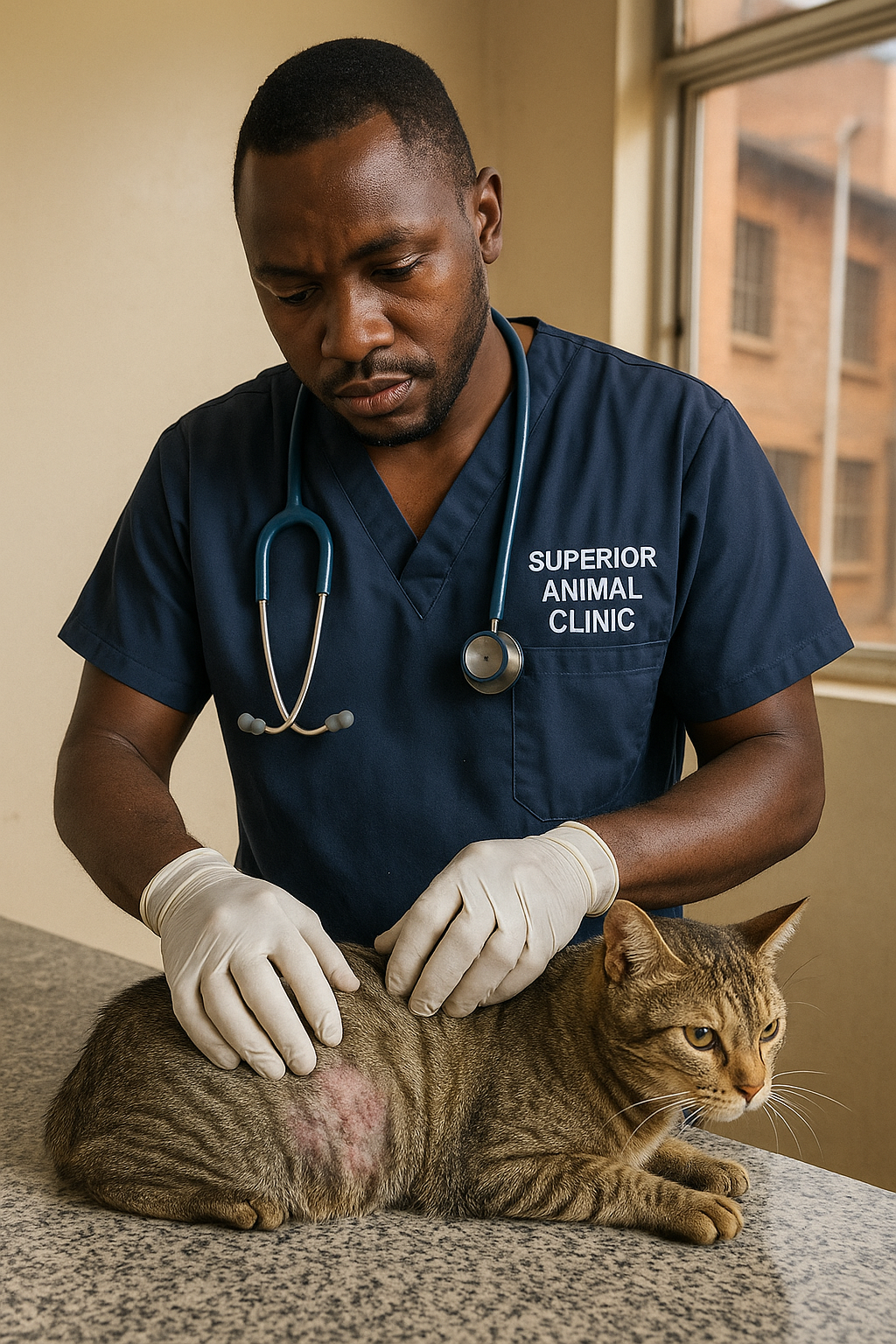
When “Just Scratching” Turns Into Something Serious
Last month, Sarah from Muyenga brought in her adorable one-year-old Persian cat, Milo, to Superior Animal Clinic in Makindye. For weeks, Milo had been scratching his neck, sneezing nonstop, and licking his paws raw. Sarah had tried changing his food, using home remedies, and even switching shampoos — but nothing worked.
When our vets examined Milo, we discovered he had a severe flea allergy and food intolerance to fish — something very common in cats across Kampala, especially in areas like Ntinda, Bugolobi, Buziga, and Ndejje, where many cats are fed table scraps or local fish. Within days of starting treatment and a new diet plan, Milo’s skin began to heal, his energy returned, and he was finally purring happily again.
Stories like Milo’s are very common among cat owners in Kampala who notice their pets scratching, sneezing, or losing fur and wonder — “Could my cat have allergies?” The good news is that at Superior Animal Clinic, we help cat owners across Makindye, Muyenga, Kololo, Munyonyo, Rubaga, Nsambya, Katwe, and beyond identify and treat allergies quickly and safely so their cats can live healthy, comfortable lives.
😿 What Are Cat Allergies?
Cat allergies happen when your cat’s immune system overreacts to substances (called allergens) that are usually harmless — like dust, pollen, flea bites, or certain foods.
The result? Itching, sneezing, watery eyes, ear infections, or skin sores.
Common symptoms cat owners in Kampala report include:
- Excessive scratching or grooming
- Red, irritated skin
- Hair loss or bald patches
- Watery eyes or nose
- Recurrent ear infections
- Vomiting or diarrhea (especially in food allergies)
If you’ve noticed any of these, your cat likely needs professional veterinary attention — and fast.
🐱 Common Types of Cat Allergies in Uganda
Cat allergies are becoming increasingly common among pet owners in Kampala — and knowing what type of allergy your cat has can make a big difference in how quickly they recover.
At Superior Animal Clinic in Makindye, we regularly diagnose and treat several types of cat allergies seen across Ntinda, Muyenga, Buziga, Kololo, Nakasero, and other Kampala neighborhoods.
Below is a detailed look at the most common types we see — their causes, symptoms, and where they tend to occur most.
1️⃣ Flea Allergy Dermatitis (FAD) – The Most Common Cat Allergy in Uganda
Description:
Flea allergy dermatitis happens when a cat is hypersensitive to the saliva from flea bites. Even a single flea bite can cause intense itching and inflammation.
Why It’s Common in Kampala:
Warm and humid environments — especially in Makindye, Buziga, Rubaga, Ndejje, Katwe, and Lungujja — provide the perfect breeding grounds for fleas. Cats that roam outdoors or live near other pets are most at risk.
Typical Symptoms:
- Constant scratching, especially around the neck and tail
- Small scabs or bald patches
- Skin redness and irritation
- Restlessness or over-grooming
Treatment at Superior Animal Clinic:
- Veterinary-grade flea control (topical and oral)
- Medicated anti-itch shampoos
- Environmental flea control advice
- Steroid or antihistamine therapy for severe reactions
2️⃣ Food Allergies and Food Intolerances
Description:
Food allergies occur when your cat’s immune system reacts to specific proteins in its diet.
Unlike food intolerances (which cause digestive upset), food allergies often cause skin itching, hair loss, and chronic ear infections.
Common Triggers in Uganda:
- Fish (especially Nile perch and tilapia)
- Chicken
- Beef
- Dairy products
- Corn, wheat, and soy in commercial cat food
Neighborhood Trends:
Food allergies are often seen in indoor cats from Kololo, Bugolobi, Nakasero, and Muyenga, where cats eat packaged or human food scraps.
Treatment at Superior Animal Clinic:
- Elimination diet trial (testing one food at a time)
- Switch to hypoallergenic or hydrolyzed protein diets
- Nutritional counseling for cat owners
3️⃣ Environmental Allergies (Atopy)
Description:
Environmental allergies (or atopy) are reactions to airborne substances like dust, pollen, and mold. These allergens enter through the skin or are inhaled.
Where It’s Common:
Cats from leafy and dusty neighborhoods like Ntinda, Nakawa, Lugogo, and Munyonyo often suffer from atopy due to high pollen and dust levels.
Symptoms:
- Sneezing and watery eyes
- Itchy skin, especially face and ears
- Chronic ear infections
- Seasonal flare-ups during dry or rainy seasons
Treatment at Superior Animal Clinic:
- Anti-inflammatory or anti-itch medications
- Regular medicated baths
- Air filtration and hygiene guidance
- Immunotherapy (for long-term cases)
4️⃣ Contact Allergies
Description:
This type of allergy develops when your cat’s skin comes in contact with irritants like shampoos, detergents, floor cleaners, or plastic feeding bowls.
Common Areas in Kampala:
Urban areas like Old Kampala, Kasubi, and Nsambya, where cleaning agents are frequently used, often report such cases.
Symptoms:
- Itching or redness where the cat’s skin touches the irritant
- Rashes on paws, belly, or chin
- Sudden discomfort after grooming or cleaning
Treatment at Superior Animal Clinic:
- Identifying and removing the irritant
- Applying soothing ointments or creams
- Switching to stainless steel or ceramic bowls
- Using vet-approved cleaning agents
5️⃣ Inhalant Allergies (Respiratory Allergies)
Description:
Just like humans, cats can be allergic to smoke, perfume, aerosol sprays, or pollution.
Where It’s Common:
Cats living near busy roads or densely populated areas like Katwe, Rubaga, and Nakawa are especially prone.
Symptoms:
- Coughing or wheezing
- Nasal discharge or sneezing
- Watery eyes
- Reduced appetite or lethargy
Treatment at Superior Animal Clinic:
- Reducing exposure to irritants
- Nebulization therapy for cats with respiratory distress
- Anti-inflammatory medication if needed
6️⃣ Drug Allergies
Description:
Some cats react adversely to medications — including antibiotics, flea preventives, or vaccines.
Symptoms:
- Sudden swelling of the face or paws
- Vomiting or diarrhea
- Itchy rash after medication use
Treatment:
- Immediate veterinary attention
- Discontinuing the offending drug
- Administration of antihistamines or steroids as needed
7️⃣ Mold and Fungal Allergies
Description:
Cats can develop allergies to mold spores or fungal particles that grow in damp areas — especially during Uganda’s rainy seasons.
Where It’s Common:
Neighborhoods like Rubaga, Ndejje, Katwe, and Lungujja, which experience higher humidity or poor drainage, often see an increase in mold-related cat allergies.
Symptoms:
- Constant sneezing and watery eyes
- Coughing or wheezing
- Skin irritation or patchy hair loss
- Recurrent respiratory infections
Treatment at Superior Animal Clinic:
- Cleaning and disinfecting your cat’s environment
- Prescribing antifungal or antihistamine medication
- Air-quality management advice for homes
- Immunotherapy for chronic mold allergies
8️⃣ Dust and Dust-Mite Allergies
Description:
Dust and dust mites are tiny invisible organisms that live in bedding, carpets, and furniture. They can trigger powerful allergic reactions in sensitive cats.
Where It’s Common:
Dust allergies are frequent in Nakawa, Ntinda, Kololo, and Muyenga, where cats live indoors or near busy roads with high dust levels.
Symptoms:
- Sneezing and nasal discharge
- Itchy face or ears
- Red eyes and frequent head shaking
- Poor coat quality
Treatment at Superior Animal Clinic:
- Anti-allergy medication and sprays
- Advice on cleaning bedding and vacuuming
- Switching to dust-free cat litter
- Regular grooming and medicated baths
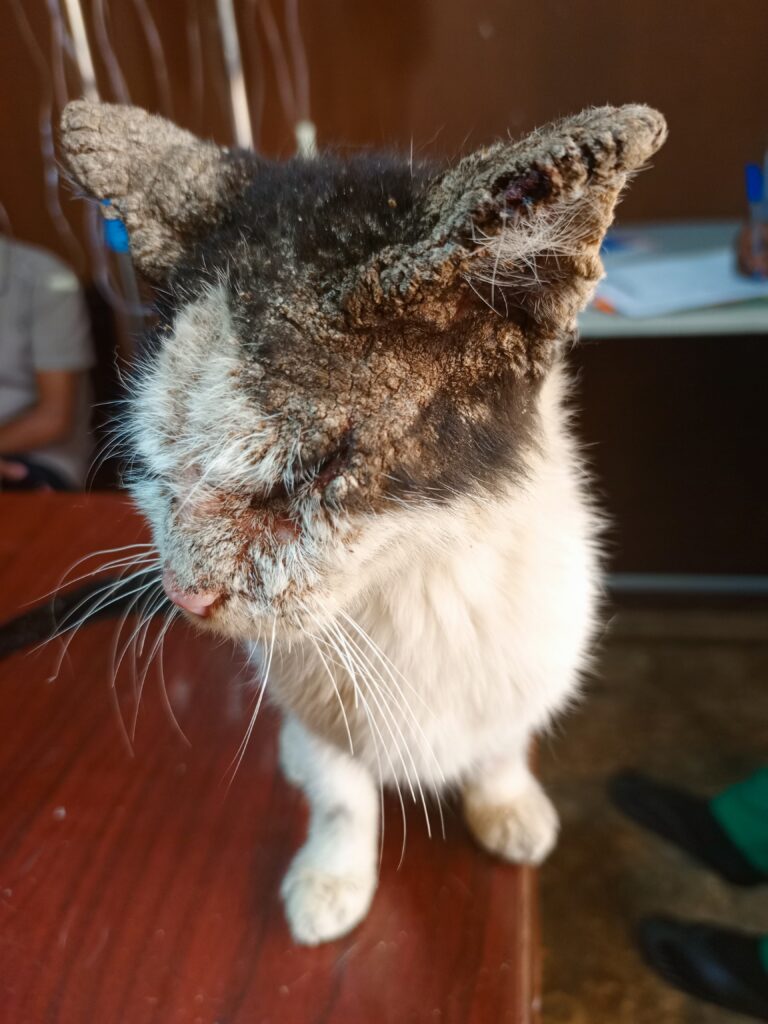
9️⃣ Perfume, Smoke, and Chemical Allergies
Description:
Cats are extremely sensitive to strong scents and household chemicals like perfumes, cigarette smoke, air fresheners, or floor cleaners.
Where It’s Common:
Urban homes in Old Kampala, Nakasero, Bugolobi, and Kololo often use scented products that may irritate cats.
Symptoms:
- Sneezing or coughing soon after exposure
- Watery eyes
- Reduced appetite
- Lethargy or hiding behavior
Treatment at Superior Animal Clinic:
- Removing or reducing the allergen from your home
- Nebulization and airway-soothing therapy
- Antihistamine or anti-inflammatory medications
- Environment detox guidance
🔟 Pollen Allergies (Seasonal Allergies)
Description:
During Uganda’s blooming seasons, airborne grass, flower, and tree pollens can trigger allergic reactions in cats.
Where It’s Common:
Cats in Muyenga, Munyonyo, Ntinda, and Lugogo, where vegetation and gardens are abundant, are often affected.
Symptoms:
- Itchy skin (especially around the face and paws)
- Sneezing fits
- Watery eyes
- Seasonal pattern of flare-ups
Treatment at Superior Animal Clinic:
- Antihistamines and anti-itch therapy
- Allergy desensitization treatment
- Bathing after outdoor exposure
- Guidance on reducing pollen contact indoors
1️⃣1️⃣ Parasite-Related Allergies (Other Than Fleas)
Description:
Apart from fleas, cats in Uganda can react to mites, ticks, or intestinal parasites that trigger skin and immune reactions.
Where It’s Common:
More frequent in outdoor cats around Makindye, Ndejje, Katwe, and Kasubi, especially during the rainy season.
Symptoms:
- Persistent scratching
- Tiny bumps or scabs on the skin
- Ear irritation (ear mites)
- Poor coat and weight loss
Treatment at Superior Animal Clinic:
- Parasite identification under microscope
- Safe antiparasitic medication
- Skin treatment and follow-up deworming
- Education on preventive parasite control
1️⃣2️⃣ Vaccine or Medication Allergies
Description:
Some cats react to certain vaccines or medications, though rare. These allergies may appear minutes to hours after administration.
Where It’s Common:
We’ve seen occasional cases across Kampala, especially in sensitive or purebred cats like Persians and Siamese.
Symptoms:
- Facial swelling or hives
- Vomiting or diarrhea
- Weakness or collapse in severe cases
Treatment at Superior Animal Clinic:
- Emergency allergy management
- Administration of antihistamines or steroids
- Monitoring and switching to alternative safe drugs
1️⃣3️⃣ Genetic and Breed-Related Allergies
Description:
Certain cat breeds are genetically more prone to allergies due to their immune system sensitivity or skin type.
Common Breeds in Uganda at Higher Risk:
- Siamese Cats – prone to food allergies
- Persian Cats – sensitive skin and dust allergies
- Maine Coons – often develop flea allergies
- Abyssinians – can suffer from pollen and environmental allergies
Why It Matters:
Breed predisposition means even a clean environment may not prevent allergies — routine vet checkups and preventive care are essential.
Treatment at Superior Animal Clinic:
- Regular skin assessments
- Genetic and environmental allergy management
- Tailored diet and lifestyle recommendations
1️⃣4️⃣ Litter Box Allergies
Description:
Some cats develop allergic reactions to scented or dusty cat litter, leading to respiratory or skin irritation.
Where It’s Common:
Indoor cats in Muyenga, Bugolobi, and Kololo, where owners use scented litters, are most affected.
Symptoms:
- Sneezing after using the litter box
- Redness around the paws
- Avoidance of litter box
Treatment and Advice:
- Switching to unscented, dust-free litter
- Cleaning the box daily
- Using non-clumping or natural litter (like corn-based or recycled paper)
1️⃣5️⃣ Secondary Allergic Reactions (from Infections or Stress)
Description:
Sometimes, cats develop allergies secondary to other conditions like bacterial infections, fungal infections, or high stress levels that alter immune balance.
Where It’s Common:
In cats that have recently been rescued or relocated — often from Kasubi, Katwe, or Nsambya, where stray or orphan kittens are common.
Symptoms:
- Generalized skin irritation
- Flaky or oily skin
- Poor appetite and lethargy
Treatment at Superior Animal Clinic:
- Treating the underlying infection or stress cause
- Immune system support supplements
- Regular monitoring and a balanced diet
🐾 Summary: Understanding Your Cat’s Allergy Type
Each allergy type requires different diagnostic and treatment approaches — that’s why guessing or using home remedies rarely works.
At Superior Animal Clinic, our experienced vets use skin tests, diet trials, and allergy blood tests to find the exact cause and give your cat long-term relief.
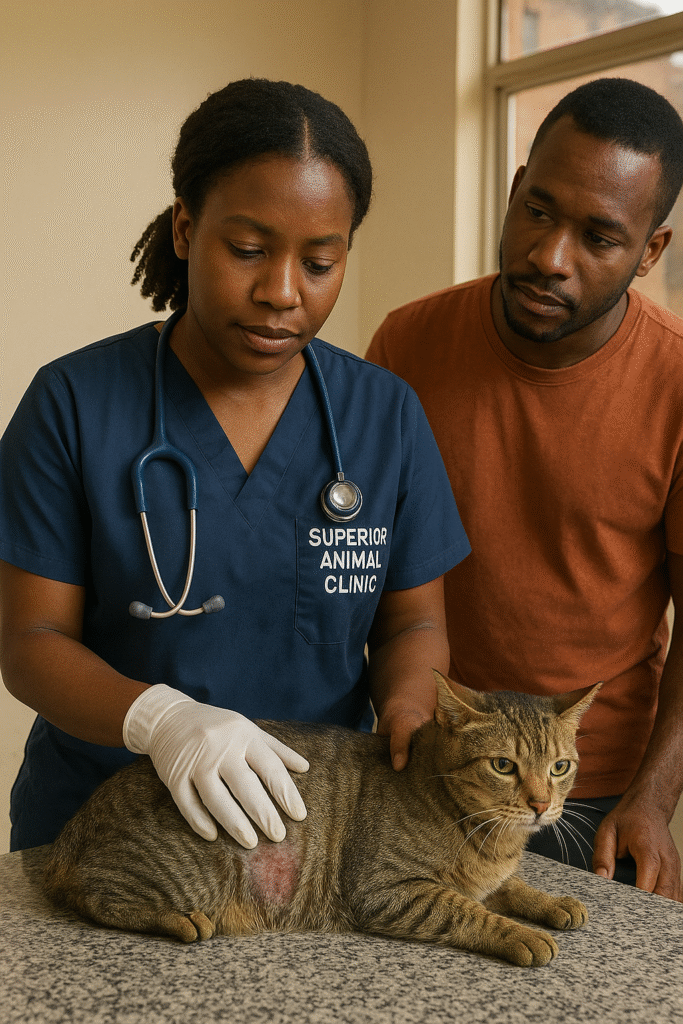
💉 How Cat Allergies Are Diagnosed at Superior Animal Clinic
We use modern diagnostic methods to pinpoint exactly what’s causing your cat’s allergy. Our process includes:
- Comprehensive Skin Examination
- Flea Check & Microscopic Analysis
- Allergy Blood Testing
- Elimination Diet Trials (for suspected food allergies)
- Skin Scrapings or Cytology (to rule out infections)
Our veterinary team ensures accurate diagnosis before starting treatment — saving you money and your cat from unnecessary discomfort.
🐾 Cat Breeds More Prone to Allergies in Uganda — And Why
Not all cats react to allergens in the same way. Some breeds are naturally more sensitive because of their genetics, skin type, or immune system structure.
At Superior Animal Clinic in Makindye, we’ve observed that certain breeds — especially purebreds and indoor cats — are more prone to developing food, flea, or environmental allergies.
Let’s look at the most common breeds we see in Kampala and why they tend to be allergy-prone.
1️⃣ Siamese Cats – Sensitive Skin and Strong Immune Reactions
Why They’re Prone:
Siamese cats have a genetically heightened immune response, meaning their bodies can overreact even to minor allergens like dust or certain proteins in food. Their short, fine coats also offer less skin protection, making them more vulnerable to flea bites and contact irritants.
Common Allergy Types in Uganda:
- Food allergies (especially to fish, chicken, and beef)
- Environmental allergies (dust and pollen)
- Flea allergies
Commonly Seen In:
Homes in Muyenga, Kololo, and Bugolobi, where Siamese cats are popular indoor pets and often fed commercial foods or table scraps.
Vet Tip:
At Superior Animal Clinic, we often recommend hypoallergenic diets and regular flea prevention for Siamese cats.
2️⃣ Persian Cats – Long Hair, Delicate Skin, and Grooming Sensitivity
Why They’re Prone:
Persians have dense, long coats that trap dust, pollen, and fleas — and their flat faces (brachycephalic structure) can make breathing irritants worse. Their skin produces excess oil, which can attract allergens and bacteria.
Common Allergy Types:
- Flea allergy dermatitis (FAD)
- Dust and pollen allergies
- Shampoo or grooming product sensitivities
Commonly Seen In:
Urban and indoor households around Makindye, Ntinda, and Nakasero, where air conditioning and indoor dust can increase allergy triggers.
Vet Tip:
We recommend frequent professional grooming, medicated baths, and vet-approved coat sprays to reduce flare-ups.
3️⃣ Maine Coon Cats – Prone to Flea and Environmental Allergies
Why They’re Prone:
Though they have thicker coats, Maine Coons have sensitive skin and a slow immune recovery rate, making them react strongly to flea bites or humid weather. Kampala’s warm, humid climate provides the perfect conditions for flea infestations, especially around Buziga, Rubaga, and Ndejje.
Common Allergy Types:
- Flea allergy dermatitis
- Mold and dust allergies
- Occasional food sensitivity
Vet Tip:
At Superior Animal Clinic, we prioritize year-round flea prevention, humidity control, and nutritional skin support for Maine Coons.
4️⃣ Abyssinian Cats – Genetic Predisposition to Environmental Allergies
Why They’re Prone:
Abyssinians, one of the oldest cat breeds, have genetically high immune reactivity, which makes them prone to atopy (environmental allergies). Their short coats don’t protect them well from pollen or dust.
Common Allergy Types:
- Dust and pollen sensitivity
- Contact dermatitis
- Food sensitivities (especially dairy and fish)
Commonly Seen In:
Homes around Nakawa, Lugogo, and Munyonyo, where gardens, open spaces, and dust exposure are common.
Vet Tip:
Frequent ear cleaning and unscented cleaning products help reduce irritation for Abyssinians.
5️⃣ British Shorthair Cats – Food and Environmental Sensitivities
Why They’re Prone:
Though sturdy-looking, British Shorthairs are prone to digestive sensitivities and mild atopy due to a weaker gut-immune link. Their thick coats can also trap allergens.
Common Allergy Types:
- Food allergies (especially to dairy and grain)
- Flea and dust allergies
- Occasional pollen reaction
Commonly Seen In:
Apartment cats in Kololo, Bugolobi, and Ntinda, where indoor dust and packaged food diets are common.
Vet Tip:
We recommend digestive enzyme supplements and hypoallergenic diets for these cats.
6️⃣ Ragdoll Cats – Gentle Nature, Delicate Immune Balance
Why They’re Prone:
Ragdolls have a docile temperament but a sensitive immune system that reacts to household allergens like detergents, perfumes, or synthetic materials. Their semi-long coats can also hold dust and pollen.
Common Allergy Types:
- Contact allergies (from cleaning products and fabrics)
- Food sensitivities
- Flea allergies
Commonly Seen In:
Comfortable indoor settings in Muyenga, Buziga, and Lubowa, where soft furnishings and scented cleaners are used.
Vet Tip:
Switching to unscented detergents, hypoallergenic bedding, and routine checkups helps prevent allergic flare-ups.
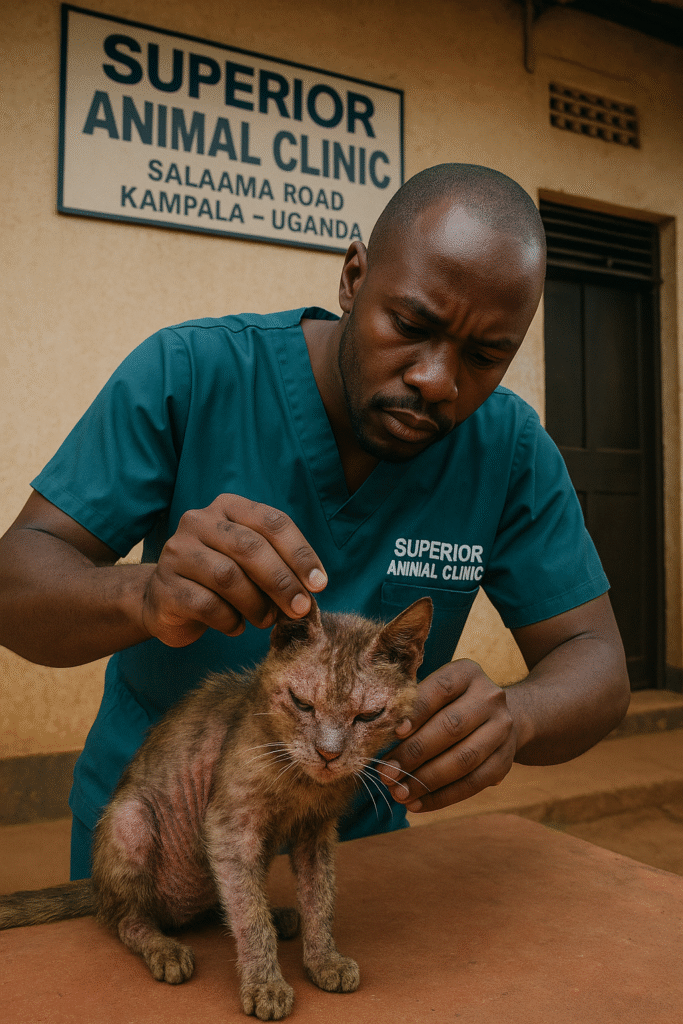
7️⃣ Oriental Shorthair Cats – Overactive Immune Response
Why They’re Prone:
Closely related to Siamese cats, Orientals have thin skin and an immune system that overreacts to small environmental changes.
Common Allergy Types:
- Airborne (dust, pollen) allergies
- Flea reactions
- Food sensitivities
Commonly Seen In:
Cat lovers’ homes in Kololo and Naguru, where Orientals are kept as indoor show cats.
Vet Tip:
We focus on balanced immune modulation through omega-3 supplements and controlled environments.
8️⃣ Domestic Short-Haired Cats (DSH) – The Most Common Allergy Cases in Kampala
Why They’re Prone:
Even mixed-breed cats (the most common in Uganda) can suffer from allergies due to constant exposure to fleas, dust, and food contaminants. Their outdoor lifestyle often increases risk.
Common Allergy Types:
- Flea allergy dermatitis
- Dust and pollen allergies
- Mold sensitivity
Commonly Seen In:
Everywhere across Kampala — especially Makindye, Kasubi, Katwe, Lungujja, and Rubaga, where outdoor cats roam freely.
Vet Tip:
Regular deworming, flea control, and balanced nutrition can dramatically reduce allergy flare-ups in domestic cats.
🧬 Why Some Cat Breeds Develop More Allergies Than Others
At Superior Animal Clinic, we’ve identified several key reasons why certain cat breeds suffer more from allergies in Uganda:
| Predisposing Factor | Explanation |
| Genetic sensitivity | Some breeds like Siamese and Abyssinians inherit immune systems that overreact to common allergens. |
| Coat type | Long-haired breeds (Persians, Ragdolls) trap more dust, pollen, and fleas, increasing exposure. |
| Skin structure | Thin or oily skin (as in Orientals and Persians) makes it easier for allergens to penetrate. |
| Indoor lifestyle | Indoor cats inhale dust, smoke, and cleaning chemicals more often than outdoor cats. |
| Climate and humidity | Uganda’s warm, humid climate boosts flea and mold growth — two major allergy triggers. |
| Dietary habits | Cats fed table food, fish scraps, or commercial foods with artificial additives develop food allergies more often. |
🐾 Final Thoughts
No matter what breed your cat is — Siamese in Muyenga, Persian in Kololo, or Domestic Short Hair in Makindye — allergies can make their life miserable if not treated early.
At Superior Animal Clinic, we specialize in breed-specific allergy diagnosis and treatment, using advanced skin tests, food trials, and safe medications to relieve your cat’s discomfort.
🍗 Common Foods That Cause Cat Allergies
Some of the foods that trigger allergic reactions in cats include:
- Beef
- Chicken
- Fish (especially tuna and sardines)
- Dairy products
- Corn and soy
If you live in Kampala suburbs like Muyenga, Makindye, or Buziga, where many pet owners feed table scraps or local fish, these allergies are quite common.
At Superior Animal Clinic, we help identify the exact food allergen and recommend safe hypoallergenic diets.
Causes & Predisposing Factors of Cat Allergies in Uganda
Cat allergies don’t just appear overnight — they develop when your cat’s immune system becomes overly sensitive to everyday substances that should normally be harmless. In Uganda, especially in warm and humid areas like Makindye, Nsambya, Muyenga, and Rubaga, several environmental and lifestyle factors make cats more likely to suffer from allergies.
Let’s break down the most common causes and predisposing factors that our veterinarians at Superior Animal Clinic see every day:
1. Fleas and Parasites (The #1 Cause in Kampala)
Fleas are by far the most common trigger of allergic reactions in cats around Kampala. Just one bite can cause intense itching, hair loss, and skin sores due to Flea Allergy Dermatitis (FAD).
- Why it’s common: Warm weather, outdoor roaming, and close contact with stray cats.
- Areas most affected: Nsambya, Katwe, Kasubi, and Ndejje — where flea infestations are more frequent due to many outdoor cats.
- Predisposing factor: Untreated cats, irregular deworming, and skipping flea control treatments.
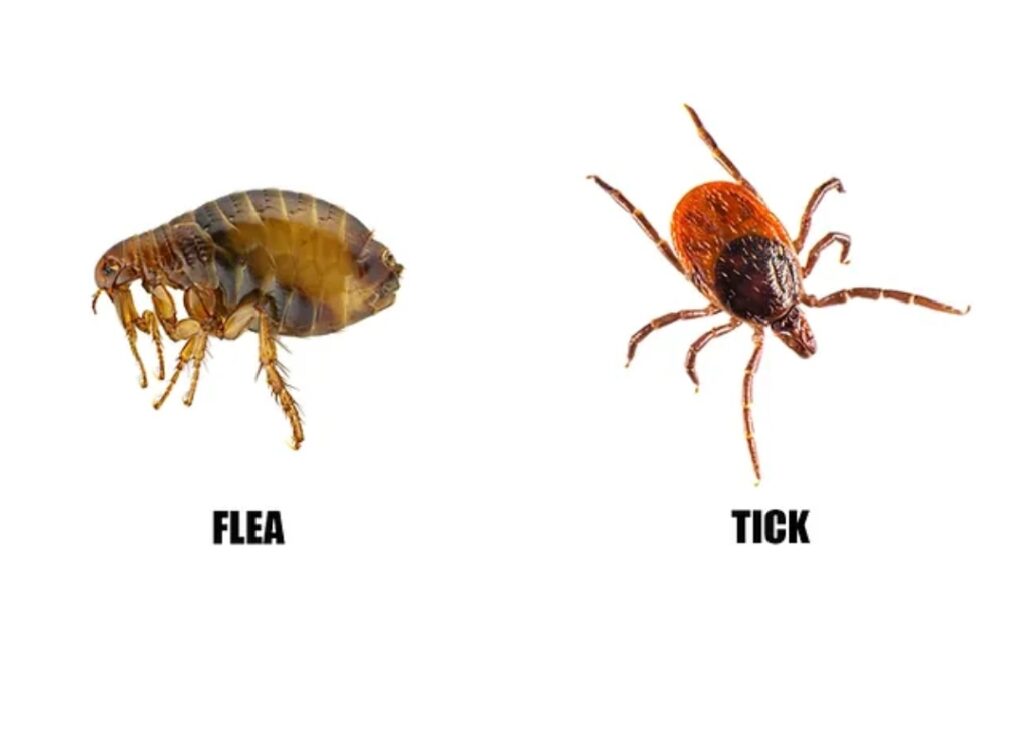
2. Food Sensitivities and Dietary Imbalances
Some cats react to certain proteins or food ingredients such as fish, beef, dairy, or chicken — all commonly used in Ugandan cat diets.
- Why it happens: Sudden diet changes, feeding table leftovers, or low-quality processed cat food.
- Predisposing factor: Indoor cats that eat one type of food for long periods, or cats fed mostly fish (a common local diet in areas like Bugolobi, Luzira, and Ntinda).
3. Environmental and Seasonal Allergens
Kampala’s humid tropical climate encourages the growth of dust mites, molds, and pollen — all of which can trigger respiratory or skin allergies in cats.
- Examples: Mold from damp homes, pollen from flowering plants, and household dust.
- Predisposing factor: Cats that spend a lot of time indoors or sleep on carpets, sofas, or bedding that traps allergens.
- Common locations: Lubowa, Muyenga, and Makindye, where rainfall and humidity are high.
4. Poor Grooming and Skin Hygiene
Cats that are not brushed regularly or cleaned after roaming outdoors may accumulate dirt, bacteria, and parasites that irritate their skin.
- Why it matters: Matted fur traps allergens and moisture, leading to fungal infections and allergic dermatitis.
- Predisposing factor: Long-haired cats like Persians and Maine Coons, especially those kept in hot, dusty environments.
5. Household Chemicals and Cleaning Products
Some detergents, air fresheners, and insect sprays used in Ugandan homes can irritate your cat’s nose or skin.
- Predisposing factor: Frequent use of perfumed cleaning products or mosquito sprays in enclosed spaces.
- Symptoms: Coughing, sneezing, watery eyes, and sudden skin irritation.
6. Poor Nutrition and Weak Immunity
A cat’s immune system plays a major role in preventing allergies. Malnutrition or unbalanced diets make cats more sensitive to common allergens.
- Predisposing factor: Feeding only carbohydrate-based foods or skipping protein-rich meals.
- Common in: Stray and rescued cats in areas like Katwe, Kasubi, and Kisenyi.
7. Genetic Predisposition (Inherited Sensitivity)
Certain cat breeds, especially Persians, Siamese, and Maine Coons, are genetically more prone to allergies.
- Predisposing factor: Purebred cats with narrow genetic diversity.
- Why it matters: Their skin and immune system tend to overreact to small environmental changes.
8. Over-Bathing or Using Human Shampoos
Many cat owners unknowingly cause skin irritation by using human soaps or excessive bathing.
- Predisposing factor: Stripping the skin of natural oils, leading to dryness and itchiness.
- Best solution: Use only vet-approved cat shampoos available at Superior Animal Clinic.
9. Stress and Environmental Change
Just like humans, stress can trigger or worsen allergies in cats.
- Predisposing factor: Moving houses, new pets, or loud environments.
- Why: Stress affects hormone balance and immunity, making the skin more reactive to allergens.
10. Polluted Air and Outdoor Dust
Kampala’s air quality — especially near busy roads in areas like Nakasero, Lugogo, and Old Kampala — exposes cats to dust, car fumes, and smoke that irritate their respiratory system.
- Predisposing factor: Cats allowed to roam outdoors or sit near open windows facing roads.
- Result: Sneezing, watery eyes, and coughing caused by airborne irritants.
💡 Expert Tip from Superior Animal Clinic:
Even if your cat looks clean and healthy, allergies can develop silently over time. Regular vet checkups and preventive care — like flea control, nutritional guidance, and blood tests — can help detect and manage allergies early before they cause serious health problems.
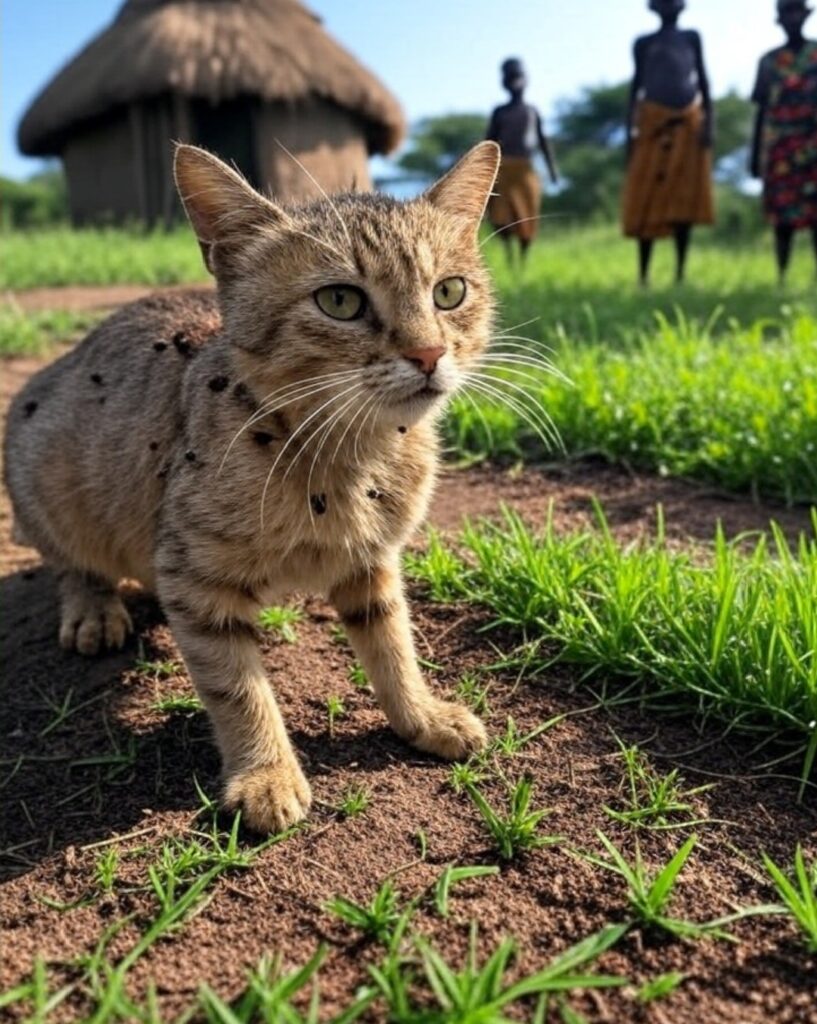
🏡 Home Remedies & Prevention Tips for Cat Allergies
While professional veterinary care is always the best solution, cat owners in Kampala can help prevent allergies by:
- Regularly bathing and grooming your cat
- Using vet-approved flea prevention
- Cleaning litter boxes, bedding, and carpets often
- Feeding balanced, allergy-free diets
- Avoiding harsh cleaning products or perfumes near your cat
If symptoms persist, visit Superior Animal Clinic in Makindye immediately — untreated allergies can lead to chronic infections or severe skin damage.
💗 Why Every Cat Owner in Kampala Should Treat Cat Allergies Early
Ignoring allergy signs can cause:
- Secondary bacterial or fungal infections
- Ear and eye problems
- Weight loss due to poor appetite
- Stress and reduced quality of life
Early diagnosis and treatment at Superior Animal Clinic can completely restore your cat’s comfort and happiness.
🔍 Why Choose Superior Animal Clinic for Cat Allergy Treatment in Kampala?
✅ Experienced veterinarians with years of expertise in cat skin and allergy care
✅ Advanced diagnostic equipment
✅ Safe, effective, and personalized allergy treatment
✅ Convenient location along Salaama Road, Makindye, Kampala
✅ Trusted by cat owners from Ntinda, Muyenga, Kololo, Buziga, Ndejje, and beyond
✅ Affordable consultation and follow-up packages
When your cat is itching, sneezing, or losing fur — think Superior Animal Clinic, the #1 veterinary clinic for cat allergy treatment in Kampala, Uganda.
🐱 Frequently Asked Questions About Cat Allergies in Kampala, Uganda
1. What are the most common types of cat allergies in Uganda?
In Kampala, the most common cat allergies include flea allergy dermatitis, food allergies, environmental allergies (dust, pollen, mold), contact allergies from shampoos or detergents, and respiratory allergies caused by smoke or dust. At Superior Animal Clinic in Makindye, we diagnose and treat all these allergy types using skin tests, blood tests, and allergy management plans tailored for your cat’s specific condition.
2. What are the main causes of cat allergies in Kampala?
Most cat allergies in Uganda are caused by flea bites, fish-based diets, poor grooming, household chemicals, humidity-related mold, and genetic sensitivity in purebred cats such as Persians, Siamese, and Maine Coons. Cats living in humid areas like Muyenga, Nsambya, Rubaga, and Buziga are especially prone due to the warm climate that favors fleas and mold growth.
3. How can I tell if my cat has allergies?
Common signs include constant scratching, hair loss, skin rashes, watery eyes, sneezing, licking paws, or scabs on the neck or back. If your cat shows any of these symptoms, it’s best to visit Superior Animal Clinic along Salaama Road, Makindye, where our experienced vets perform allergy screening to identify the exact cause.
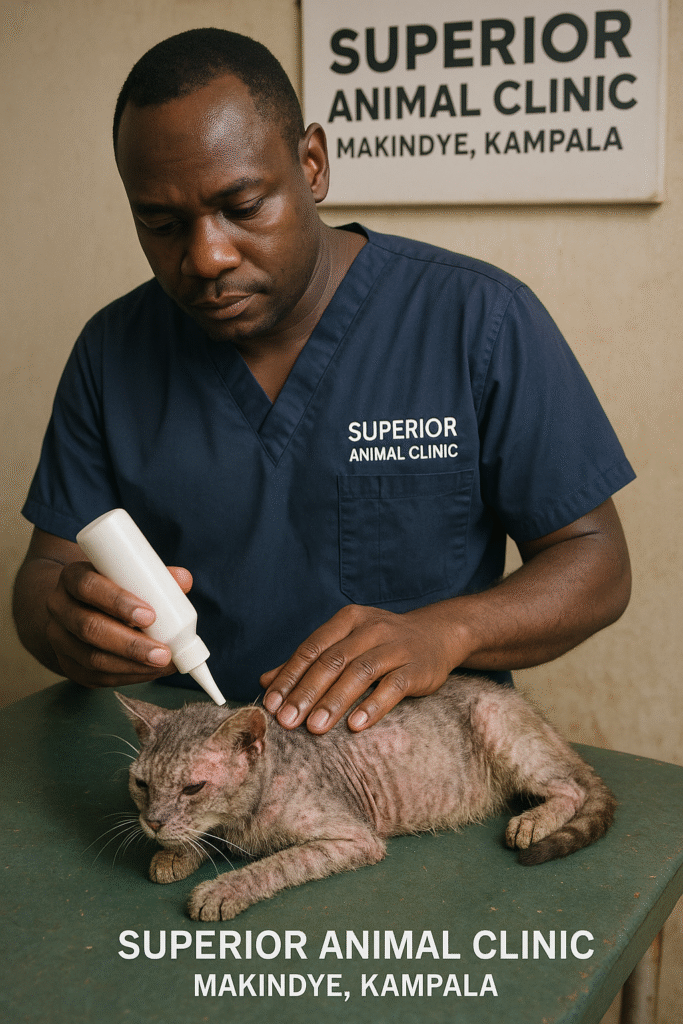
4. Which cat breeds in Uganda are most prone to allergies?
Breeds such as Persian cats, Siamese, Maine Coons, and British Shorthairs are more likely to suffer from allergies. Their long coats trap dust and fleas, and their immune systems tend to overreact to allergens. At Superior Animal Clinic, we offer breed-specific allergy prevention tips and grooming routines to help keep them healthy and comfortable.
5. How do veterinarians diagnose cat allergies at Superior Animal Clinic?
Our vets perform a step-by-step diagnosis that includes:
- Full physical examination and skin evaluation
- Flea checks and parasite tests
- Elimination diet trials for food allergies
- Blood and intradermal tests for environmental or inhaled allergens
We combine these methods to pinpoint the allergy and recommend the most effective treatment plan.
6. What is the best treatment for cat allergies in Kampala?
Treatment depends on the cause. At Superior Animal Clinic, we may recommend:
- Flea control and preventive medications
- Hypoallergenic or prescription diets
- Antihistamines or anti-itch medication
- Topical creams and medicated baths
- Allergy desensitization therapy for chronic cases
Our treatment plans are customized to your cat’s needs and lifestyle.
7. How much does cat allergy treatment cost in Kampala, Uganda?
Treatment costs vary depending on the allergy type and severity. On average, diagnosis and treatment at Superior Animal Clinic range between UGX 80,000 to UGX 300,000, including testing, medication, and follow-up. You’ll always get a clear cost estimate after your cat’s examination.
8. Can cat allergies go away on their own?
No — untreated allergies can worsen over time. Flea or food allergies can lead to secondary skin infections or hair loss. Early diagnosis and treatment at Superior Animal Clinic Makindye help prevent complications and keep your cat comfortable.
9. What foods commonly cause allergies in cats in Uganda?
Fish (especially tilapia and silverfish), beef, chicken, and dairy are the most common culprits. Certain Persian and Siamese cats in Kampala are particularly sensitive to fish and chicken. Our veterinarians can recommend hypoallergenic diets that suit your cat’s digestive and immune system.
10. How can I prevent cat allergies at home?
Here’s how cat owners in Kampala, Ntinda, Ndejje, Muyenga, and Lubowa can reduce allergy risks:
- Use monthly flea prevention treatments.
- Avoid feeding leftover or fish-only diets.
- Use unscented detergents and cat-safe shampoos.
- Keep your cat’s bedding clean and dry.
- Schedule routine vet check-ups at Superior Animal Clinic for early detection.
11. Are indoor cats safe from allergies?
Not entirely. Indoor cats can still develop allergies from dust mites, perfumed cleaning products, or mold in damp rooms. Regular cleaning and proper ventilation help, but veterinary testing is still needed to confirm the cause.
12. Do cat allergies affect humans in the same home?
While cats can’t pass their allergies to humans, the allergens (like flea bites, dust, and dander) can irritate sensitive people. Treating your cat’s allergy also makes your home healthier for everyone — another reason to get professional help from Superior Animal Clinic.
13. What home remedies can help cats with mild allergies?
Mild cases can improve with frequent grooming, hypoallergenic wipes, Omega-3 supplements, and clean bedding. However, it’s still best to have a vet check first — some skin irritations may look mild but hide deeper problems like fungal infections.
14. How soon can I expect improvement after treatment?
Most cats show visible improvement within one to two weeks after proper diagnosis and treatment at Superior Animal Clinic. Chronic or long-term allergies may take several months to fully stabilize.
15. Why should I choose Superior Animal Clinic for my cat’s allergy treatment?
Because we’re Kampala’s trusted veterinary clinic for accurate diagnosis, advanced treatment, and compassionate care. Located conveniently in Makindye along Salaama Road, we serve cat owners from Ntinda, Bugolobi, Muyenga, Ndejje, Kololo, and all across Kampala — helping your cat live healthier, allergy-free, and happier every day.
16. Can kittens develop allergies in Kampala?
Yes, even kittens as young as 8–12 weeks can develop food, flea, or environmental allergies. Early signs include excessive scratching, sneezing, or watery eyes. At Superior Animal Clinic in Makindye, we screen kittens for allergies to start preventive care early.
17. Are certain seasons worse for cat allergies in Uganda?
Yes. In Kampala’s rainy season, mold and flea populations increase, triggering more allergic reactions. Dry seasons can worsen dust and pollen allergies, especially in neighborhoods like Lugogo, Muyenga, and Ntinda.
18. Can cat allergies cause hair loss?
Absolutely. Allergies — especially food, flea, or environmental — can lead to patchy hair loss, scabs, or bald spots. Early treatment at Superior Animal Clinic can reverse hair loss and prevent infections.
19. Can cat allergies affect their appetite?
Yes. Severe allergies may cause mouth or throat irritation, gastrointestinal upset, or lethargy, which can reduce appetite. Cats from areas like Kololo, Bugolobi, and Makindye often show these signs when allergies are left untreated.
20. Do cat allergies affect all breeds the same way?
No. Persians, Siamese, Maine Coons, Abyssinians, and British Shorthairs are more genetically prone. Domestic short-haired cats may still develop allergies due to environmental factors, especially in Buziga, Rubaga, and Ndejje.
21. How often should I bring my allergic cat for check-ups?
Cats with known allergies should have every 3–6 month check-ups. For preventive care, annual visits are recommended. At Superior Animal Clinic, we schedule follow-ups to monitor progress and adjust treatments.
22. Can flea prevention alone stop cat allergies?
Flea control is essential but not always sufficient. Many cats also react to food, dust, pollen, or household chemicals. Comprehensive allergy management at Superior Animal Clinic combines flea control, diet, and environmental adjustments.
23. Are allergy tests safe for cats in Kampala?
Yes. Our allergy testing methods — including blood tests and skin tests — are completely safe and minimally invasive. They help vets in Makindye, Muyenga, Ntinda, and Kololo identify triggers quickly.
24. Can cat allergies cause ear infections?
Yes. Cats with food or environmental allergies often develop chronic ear infections, which can cause itching, odor, and discharge. Early treatment at Superior Animal Clinic prevents long-term complications.
25. How do I know if my cat has a food allergy or intolerance?
Signs of food allergy include itchy skin, hair loss, vomiting, or diarrhea, usually appearing after consuming certain proteins. A food elimination trial at Superior Animal Clinic in Makindye identifies the specific trigger safely.
26. Can indoor cats get flea allergies in Kampala?
Yes. Fleas can still enter homes through windows, other pets, or visitors, causing reactions even in fully indoor cats. Regular vet-recommended flea treatments are essential.
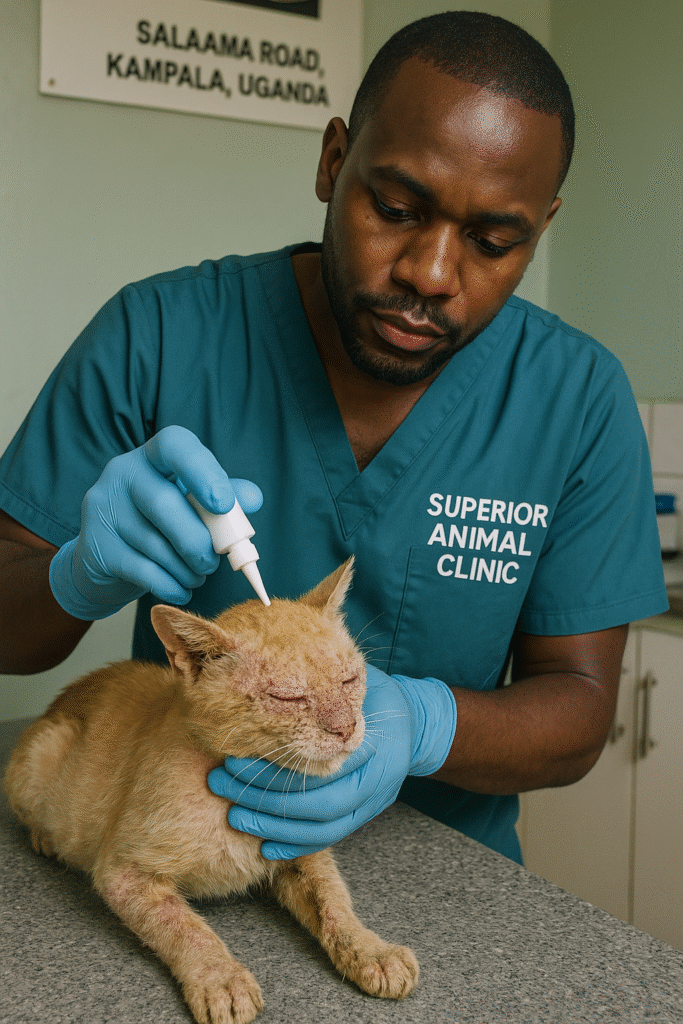
27. Are allergic reactions in cats permanent?
Not always. Many allergies are manageable with early diagnosis and proper care. At Superior Animal Clinic, we create long-term management plans to control symptoms and improve quality of life.
28. Can stress make cat allergies worse?
Yes. Stress triggers immune changes that exacerbate allergic reactions, especially in urban cats in Kololo, Ntinda, or Rubaga. Calm environments and vet-approved supplements can help reduce flare-ups.
29. Can I prevent allergies in newly adopted cats in Kampala?
Yes. Preventive steps include early flea control, proper diet, routine check-ups, and a clean environment. At Superior Animal Clinic, we guide new cat owners in Muyenga, Makindye, and Bugolobi on proactive allergy prevention.
30. Do allergies affect my cat’s behavior?
Yes. Allergic cats may become restless, irritable, or withdrawn due to itching or discomfort. Prompt treatment at Superior Animal Clinic restores comfort and normal behavior.
🏁 Final Takeaway
If you’re searching “best vet for cat allergies in Kampala” or “cat skin and food allergy treatment near me,” your best choice is Superior Animal Clinic, Makindye.
We combine modern veterinary technology, compassionate care, and affordable treatment to help your cat recover quickly.
📍 Visit us today along Salaama Road, Makindye, Kampala, Uganda
📞 Call or WhatsApp: +256 771909946
🌐 Website: superioranimalclinicvet.com
Your cat deserves the best — and at Superior Animal Clinic, that’s exactly what we deliver.

Gave 488betlogin a go last week, not bad at all! Registration was quick, and they have a pretty good selection of sports to bet on. Worth a squiz: 488betlogin
Can you be more specific about the content of your enticle? After reading it, I still have some doubts. Hope you can help me.